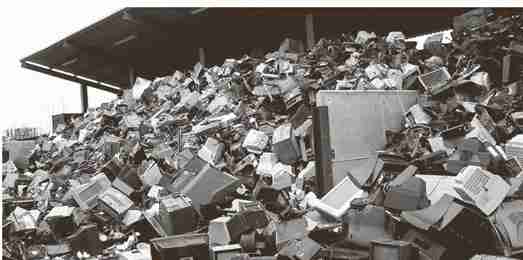By JEROME R. STOCKFISCH The Tampa Tribune
TAMPA, Fla. – With his reversed drill, Donavan Guzman unscrews the power supply from the back of a Dell Optiplex 740 desktop business computer. He tosses it into a specific bin, pops the cover off the computer, yanks a fistful of wires and drops them into another bin.
He pulls out the media drive, hard drive, heater and processor, all of which go to bins of their own. Ultimately, he pops the battery and heat-sink from the motherboard, removes another 10 screws and deposits the motherboard into a bin of its own. Within two minutes, Guzman has reduced the computer tower, which in its prime could run $900, into $5 to $7 worth of recycled parts.
In a warehouse off East Hillsborough Avenue, Guzman and his co-workers at Urban E Recycling toil amid boxes, stacks, shelves, barrels and bins of computers, mobile phones, cable boxes, video games – even the odd Braille printer. “Being green is not easy,” said Greg Rabi- nowitz, who founded the company three years ago in his garage. “It’s hard, dirty work. But I love going home dirty. We make it fun here. It’s cool to be doing the right thing.” With the use of electronic devices growing exponentially _ computers are now typically used for three years, televisions less than two, and mobile phones, 18 months – the obsolete equipment being left behind is keeping pace. Electronic waste is now the fastest growing waste stream in the world.
Fortunately, consumers and local businesses no longer have to shoulder the burden of trying to figure out what to do with discarded electronic devices. Several companies, from mom-and-pops such as Rabinowitz’s, with 11 employees, to Sims Recycling Solutions, a global giant with a presence in Tampa, will take the problem off of companies’ hands. And local county solid waste sites allow households to dispose of their electronics in an environmentally friendly way. “The county doesn’t want residents throw- ing away any electronics or household hazardous waste into the garbage,” said Andrea Stermer, a Hillsborough waste reduction specialist.
Here’s why: First, some of the stuff in electronic devices is downright dangerous. They can contain lead, mercury, arsenic and an alphabet soup of compounds that shouldn’t sit in landfills. The Blacksmith Institute, a nonprofit that focuses on global pollution, estimates that toxic e-waste threatens the health of 100 million people worldwide.
Secondly, there’s a lot of valuable stuff in there. “Recyclables are something we want to break apart, turn into their commodity component and return to the market as raw materials,”said Eric Harris, vice president of government affairs with the Institute of Scrap Recycling Industries.
A United Nations University study indicated that a ton of used mobile phones _ about 6,000 handsets _ contains about 3.5 kilograms of silver, 340 grams of gold, 140 grams of palladium and 130 kilograms of copper. That has a combined value of about $15,000.
Scrap recycling businesses have been at it for decades, but in the early 2000s, electronics recycling took off.
Electronics recyclers earned about $20.6 billion in revenue last year, up from less than $1 billion in 2002, according to ISRI. They employ more than 45,000 full-time employees, up from 6,000 in 2002.













No Comment